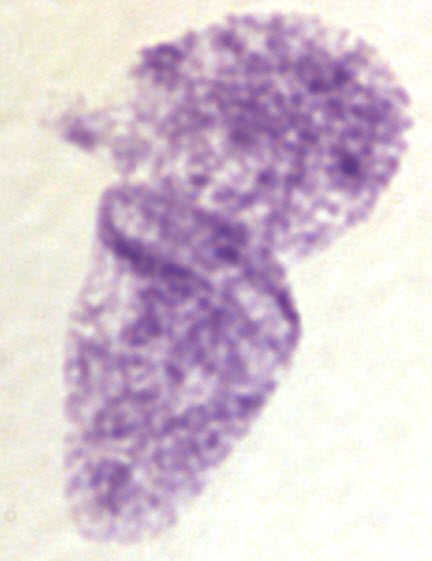United Therapeutics to develop cancer therapies based on research in novel stem-cell-like cells, via exclusive license from MIT
July 13, 2007 | Source: KurzweilAI
United Therapeutics Corporation has signed an agreement with the Massachusetts Institute of Technology (MIT) to exclusively license breakthrough research that may lead to new ways to diagnose and treat cancer, KurzweilAI.net has learned.
A research program, funded by United Therapeutics and led by MIT Professor William Thilly and MIT Research Scientist Dr. Elena V. Gostjeva, will further explore “metakaryotic” cells that may play a role in the development of some cancers.
In 2003, Gostjeva first discovered unusual cells with bell-shaped nuclei that gave rise to cells with multiple other nuclear forms in developing fetal tissues as well as in precancerous and cancerous tissues. “We believe that the study of this peculiar biology will provide knowledge of value for advances in cancer treatment, and will have applications in many other fields of medicine,” she said.
Ray Kurzweil, a member of the Board of Directors of United Therapeutics and the MIT Corporation, will be working with Professor Thilly and Dr. Gostjeva to “help develop the full potential of this technology,” he said. “The discovery of these metakaryotic cells appears to be a fundamental addition to our knowledge of biology, and their unique properties show great potential for identifying orthogonal approaches to fighting cancer and novel approaches to other disorders of cell growth and proliferation.”

Could these stem-cell-like “metakaryotic” cells go haywire and cause some forms of cancer? Dr. Elena V. Gostjeva originally discovered this strange object in fetal gut samples and later, in colon tumor and cancer tissue. This photomicrograph shows an example of asymmetrical amitotic nuclear fission (cell replication without chromosomes) of a bell-shaped nucleus (left) within a metakaryotic cell forming a much larger cigar-shaped nucleus (right). The new nuclei derived from the bell-shaped nuclei populate fetal and tumor tissue by successive mitotic divisions. Gostjeva, Thilly and associates have found these bell-shaped nuclei in fetal organs, in precancerous tissues such as colonic polyps, and in markedly large numbers in solid tumors such as colon cancer. They are rarely spotted in normal adult tissues. (Credit: E. V. Gostjeva et al./ Cancer Genetics and Cytogenetics)
The metakaryotic cells appear to have properties expected for fetal/juvenile stem cells, which can differentiate (convert) into all cell types in the adult body. “For more than a century, cancer researchers have seriously considered tumors to reflect characteristics of embryos,” said Thilly and Gostjeva in a 2006 paper [1].
“Adenocarcinoma [such as colon cancer] looks as if it were embryonic tissue simply growing at the fetal rate to form embryonic colon.” In addition, “Metakaryotic nuclei can divide both symmetrically and asymmetrically, a capacity generally reserved for stem cells,” they stated. This finding has already been replicated in several laboratories, Thilly told KurzweilAI.net.
The new cells were named “metakaryotes” because they have features of DNA synthesis and segregation distinct from those of both prokaryotes (unicellular organisms without distinct nuclei and with DNA not organized in chromosomes) and eukaryotes (unicellular and multicellular organisms with nuclei and that divide by mitosis).
The metakaryotes appear to have preserved a form of nuclear replication and division distinct from the familiar chromosome-based mitosis in eukaryotes and that may be essential for organogenesis.
“The exclusive license agreement with MIT covers human and veterinary diagnostic and therapeutic applications of broad metakaryotic-cell patent applications,” said Martine Rothblatt, Ph.D., Chairman and Chief Executive Officer of United Therapeutics.
“This discovery of metakaryotic cells may be every bit as fundamental as the discoveries of prokaryotic and eukaryotic cells. I am filled with anticipation for the therapeutic potential emerging from this work, especially for the treatment of chronic, life-threatening diseases, in keeping with our corporate mission.”
Rothblatt said United Therapeutics will fund the metakaryote research in the MIT Department of Biological Engineering for three years, with an option to fund additional years. The agreement also provides for an exclusive option to license future discoveries resulting from the research sponsorship.
“This landmark research is of great importance to our process of novel drug discovery,” said Christopher Nicodemus, MD, FACP, Senior Vice President Clinical Research and Development, Unither Pharmaceuticals. “One reason these cells were not identified and described previously is that standard microscopic anatomy technique delays viewing and also utilizes thin sectioning of tissue, both of which disrupt this anatomy. Dr. Gostjeva also used advanced image-processing software to image these subtle features.”
United Therapeutics, a Silver Spring, Maryland-based biotechnology company, is focused on the development and commercialization of innovative therapeutic products for patients with chronic and life-threatening cardiovascular, cancer and infectious diseases.